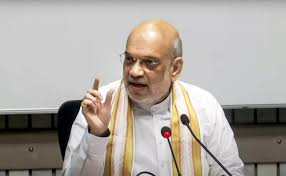
Table of Contents
In a recent development, Amit Shah, India’s Union Home Minister, announced the formation of a panel to monitor the situation along the Bangladesh border. This move comes amidst growing concerns over border management, security, and cross-border issues between the two neighboring countries. The panel’s creation highlights the importance of addressing both security and humanitarian aspects of the India-Bangladesh border situation.
Background of the Border Situation
The India-Bangladesh border, spanning approximately 4,096 kilometers, is one of the longest international borders in the world. It traverses various terrains including rivers, forests, and plains, making it a complex and challenging region to manage. The border has historically been a point of contention due to issues like illegal immigration, smuggling, and human trafficking.
In recent years, relations between India and Bangladesh have generally been positive, marked by cooperative agreements and shared interests in regional stability. However, tensions and challenges persist, particularly concerning the management of the extensive and often porous border.
Amit Shah’s Announcement
The Formation of the Panel
Amit Shah’s announcement regarding the formation of a panel is a strategic response to the evolving situation along the Bangladesh border. The panel is tasked with monitoring and addressing several key issues:
- Border Security: Ensuring that the border is secure from unauthorized crossings and smuggling activities. This includes deploying additional resources and technology to enhance surveillance and patrolling.
- Humanitarian Concerns: Addressing the humanitarian aspects of the border situation, such as managing the flow of refugees or migrants and providing assistance to communities affected by border tensions.
- Cross-Border Cooperation: Improving coordination with Bangladeshi authorities to address issues that affect both nations, such as illegal trade and security threats.
- Infrastructure Development: Overseeing the development and maintenance of border infrastructure, including fencing, check-posts, and surveillance systems.
Objectives of the Panel
The panel’s primary objectives include:
- Enhancing Security Measures: By deploying advanced surveillance systems and increasing patrolling, the panel aims to bolster security along the border.
- Facilitating Diplomatic Engagement: Strengthening diplomatic channels between India and Bangladesh to resolve any cross-border disputes or issues collaboratively.
- Addressing Illegal Activities: Tackling problems related to smuggling, illegal immigration, and trafficking by implementing more stringent checks and preventive measures.
- Promoting Regional Stability: Ensuring that the border region does not become a source of instability for the broader South Asian region.
Key Issues and Concerns
Illegal Immigration
One of the longstanding issues along the India-Bangladesh border is illegal immigration. The porous nature of the border makes it challenging to regulate and control the movement of people. India has raised concerns about illegal immigration, which it views as a security threat and a strain on its resources.
Smuggling
The border is also a hotspot for smuggling activities, including drugs, firearms, and other contraband. Smugglers exploit the border’s extensive and varied terrain to evade detection. Addressing Amit Shah smuggling requires enhanced monitoring and collaboration with border security forces.
Human Trafficking
Human trafficking is another critical issue, with reports of people being trafficked across the border for forced labor or other exploitative purposes. The panel will need to work closely with humanitarian Amit Shah organizations to combat trafficking and protect vulnerable individuals.
Environmental and Humanitarian Impact
The construction of border infrastructure and increased security measures can sometimes have environmental and humanitarian impacts. The panel will need to balance security Amit Shah concerns with considerations for local communities and ecosystems.
India-Bangladesh Relations
Historical Context
India and Bangladesh have a complex history marked by both cooperation and conflict. The two nations share a deep cultural and historical bond but have faced challenges related to border management and resource sharing.
Recent Developments
In recent years, both countries have made efforts to improve relations through various agreements and collaborations. For instance, agreements on sharing river waters and joint efforts to combat terrorism have strengthened bilateral ties. However, ongoing issues at the border occasionally strain Amit Shah these relations.
Impact of the Panel’s Formation
Improved Border Management
The establishment of the panel is expected to lead to more effective border management. By focusing on both security and humanitarian issues, the panel aims to address the multifaceted challenges at the border.
Enhanced Diplomatic Relations
The panel’s work could foster better diplomatic relations between India and Bangladesh. Collaborative efforts to resolve border issues can enhance mutual trust and cooperation.
Boosted Security
Increased security measures and technological advancements are likely to improve the overall safety and stability of the border region. This will benefit both countries by reducing Amit Shah illegal activities and potential conflicts.
Humanitarian Benefits
Addressing humanitarian concerns, such as migrant and refugee issues, can lead to Amit Shah better living conditions for affected communities and contribute to regional Amit Shah stability.
Future Prospects
Strengthening Cooperation
The success of the panel will depend on the ability to foster strong cooperation between Indian and Bangladeshi authorities. Joint efforts and information sharing are crucial for addressing cross-border issues effectively.
Monitoring and Evaluation
Regular monitoring and evaluation of the panel’s work will be essential to ensure that it meets its objectives. Feedback from ground-level operations and communities will help in making necessary adjustments.
Sustainable Solutions
Long-term solutions require sustainable approaches that consider environmental, social, and economic factors. Balancing security with humanitarian and environmental concerns will be vital for the panel’s success.
Conclusion
The formation of the panel to monitor the current situation along the Bangladesh border, as announced by Amit Shah, represents a significant step in addressing the complex challenges of border management. By focusing on security, humanitarian issues, and cross-border cooperation, the panel aims to enhance the effectiveness of border controls and improve relations between India and Bangladesh. The panel’s work will be crucial in shaping the future of border management and regional stability, demonstrating a commitment to both security and humanitarian concerns. As the situation evolves, the panel’s efforts will play a key role in fostering a more secure and cooperative border environment.







